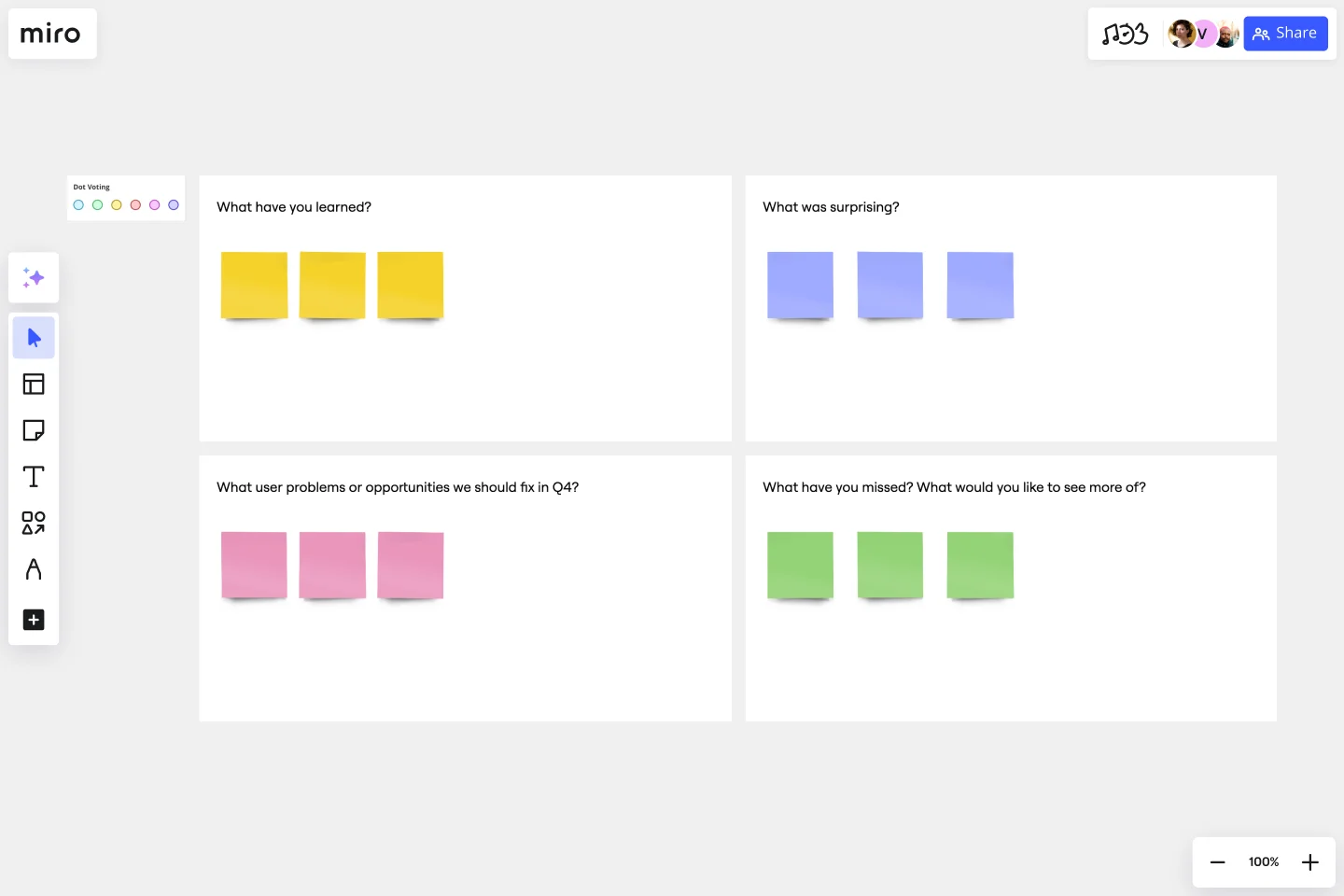Meeting Reflection Template
Share learning experiences and new ways of thinking to grow as a team
About the Meeting Reflections Template
Meeting reflections give your team an opportunity to talk about how they approach their work. Use the meeting reflections template to create space for a conversation to clarify how people think, feel, articulate the "why" behind their work beyond basic project management needs.
What is a meeting reflection?
A meeting reflection is led by "learners," team members who share stories with the rest of their team.
Learners can choose to present a topic or story, and the rest of the team can follow up with a series of questions. Alternatively, the session can be set-up as a live question-and-answer session between the nominated learner and the team.
Typically, one person on your team will assume the learner role and share a recent experience that may benefit everyone else. The rest of the team will take on an active listener role, asking questions as needed, making a meaningful connection to their own work, or wider business values and initiatives.
When to use the meeting reflection template
A meeting reflection aims to dig deep into how your team learns new skills, document key observations, and figure out how to build on those skills for future development.
Meeting reflections allow teammates to share new information about a client’s business or an internal business initiative. Your team can also offer problem-solving techniques or even recommend a new book, podcast, or movie worth seeking out.
These group reflections can encourage colleagues at all levels to engage in each other’s professional development.
How to use the meeting reflection template
Get started by adding the meeting reflection template to your board, then take the following steps to make it your own:
1. Start with an icebreaker to set the tone
To get everyone thinking creatively from the start, encourage an unstructured communication approach. Give everyone an opportunity to get to know each other.
2. Ask the “learner” to share what they’ve learned recently
As the learner in your group is sharing their experience, encourage the team to write down their observations on sticky notes. These notes can be assigned to a grid (such as “what have you missed?”) that aligns with the narrative and can prompt useful follow-up questions.
3. Respond with questions, observations, or advice as a team
After the learner has finished speaking, ask each person in the group to share one observation or question to dig deeper into the story. The more specific the ask or detail being shared, the better the insight. Nominate a note-taker in the group to write down the insights, and use them to make sure these discussions stay timely and on track.
4. Decide on follow-up actions as a team
To wrap up, the note-taker in the group can go through a verbal summary of your meeting. The learner can also add any details that may have been left out. As a team, you can decide if you’d like to follow up on any ideas uncovered during the session. You may also want to repeat the meeting on a different date for someone else’s benefit on the team. See if there’s potential to turn this into a regular team ritual if it proves to be useful for team-building and skill sharing.
Get started with this template right now.
PI Planning Template
Works best for:
Agile Methodology, Strategic Planning, Software Development
PI planning stands for “program increment planning.” Part of a Scaled Agile Framework (SAFe), PI Planning helps teams strategize toward a shared vision. In a typical PI planning session, teams get together to review a program backlog, align cross-functionally, and decide on the next steps. Many teams carry out a PI planning event every 8 to 12 weeks, but you can customize your planning schedule to fit your needs. Use PI planning to break down features, identify risks, find dependencies, and decide which stories you’re going to develop.
Start, Stop, Continue Template
Works best for:
Retrospectives, Meetings, Workshops
Giving and receiving feedback can be challenging and intimidating. It’s hard to look back over a quarter or even a week and parse a set of decisions into “positive” and “negative.” The Start Stop Continue framework was created to make it easier to reflect on your team’s recent experiences. The Start Stop Continue template encourages teams to look at specific actions they should start doing, stop doing, and continue doing. Together, collaborators agree on the most important steps to be more productive and successful.
Agenda Template
Works best for:
Project Management, Meetings, Workshops
Even when you’ve hosted meetings for years, hosting them online is different. Keeping them structured, purposeful, and on-task is key. That all starts with having a detailed agenda, and this template makes it so easy for you to create one.
Customer Problem Statement Template
Works best for:
Ideation, Design Thinking, Product Management
Put yourself in the shoes of your consumers with a customer problem statement. Figure out their problems and how your product or service can solve those problems and make their lives easier. As a bonus, you’ll better understand your customers throughout the process.
Rose, Bud, Thorn Retrospective Template
Works best for:
Agile Workflows, Retrospectives
Run a simple yet effective retrospective with the Rose, Bud, Thorn Retrospective Template. Identify positive outcomes, challenges, and opportunities moving forward.
Research Template
Works best for:
Education, Desk Research, Product Management
Teams often need to document findings from usability testing sessions and customer interviews into a systematic, flexible user research template. Collecting everyone’s observations into a centralized location makes it easier to share insights company-wide and suggest new features based on user needs. Research templates can be used to record quantitative or qualitative data.. When it’s your job to ask questions, take notes, learn more about your user, and test iteratively, a Research Template can help you validate your assumptions, find similarities across different users, and articulate their mental models, needs, and goals.
